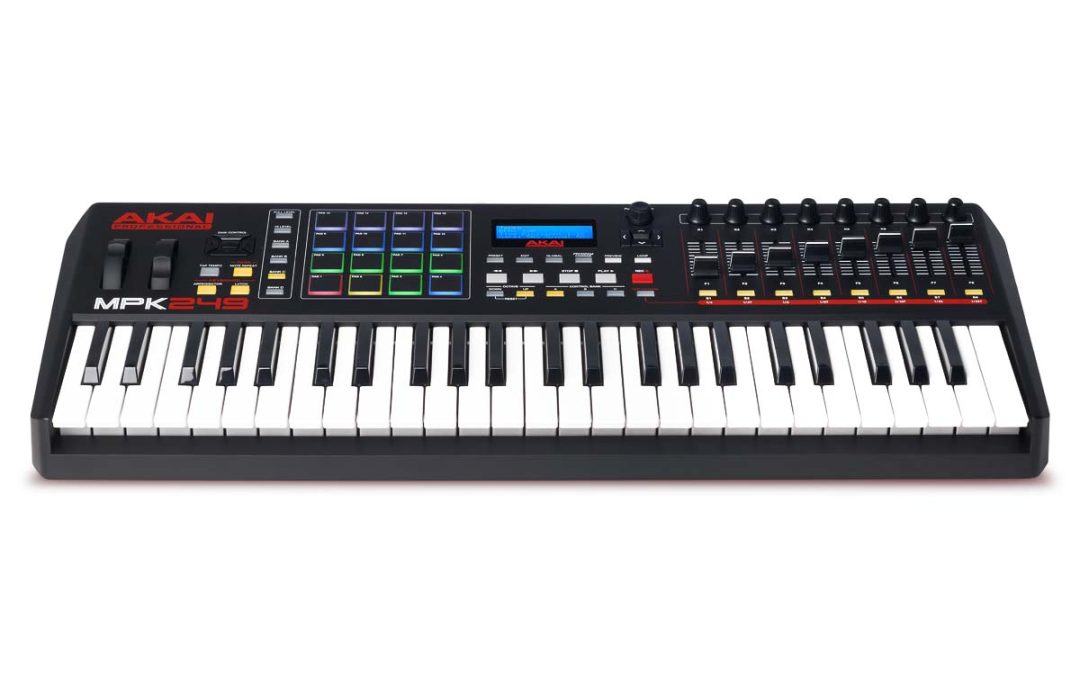The Akai MPK series is hands-down the number one choice for countless musicians and producers. Akai is a name that ensures a combination of useable features, balanced pricing, and rugged reliability. If you’ve graduated from the ever-popular MPK Mini, then the next logical step is the MPK249. In this Akai MPK249 review, we’ll determine whether this is one of the optimal choices in an all-around MIDI controller.
The Akai Professional MPK249 Is One of the Most Popular Mid-Range MIDI Keyboards on the Market
It’s true. There are a plethora of MIDI keyboards out there, and very few are as recognizable as anything Akai’s made. At a glance, the Akai MPK249 has 49 semi-weighted keys, 24 assignable knobs/faders/switches, 16 MPC pads with four banks for a total of 64, and comprehensive transport control for DAW integration.
It’s a true plug-and-play controller powered via USB. Set up is as seamless or as complex as you’d like; hook it up and immediately start playing your virtual instruments, or take a deep dive into the included VIP software to map functions and more.
Notable Features
We’ve narrowed down some of our favorite aspects in this Akai MPK249 review. Let’s get started!
Improved Keyboard Layout
49 keys is the sweetspot for MIDI controllers. You’ll find yourself using the octave up/down control way less frequently than with a 25-key controller. Plus, the semi-weighted, full-sized keys add a nice, professional feel to an already well designed MIDI controller.
DAW Control Keypad
The MPK249 comes with a transport section that integrates with your DAW. That’s helpful when you’re trying to create an efficient workflow, so you don’t have to take your hands off the keyboard to grab the other (computer) keyboard to start playback or roll back a take to overdub.
Production Software
The Akai MPK249 also comes with a fleet of free software including Ableton Live Lite, Hybrid 3 by AIR, Sonivox Twist 2.0, MPC Beats, and Akai’s own award-winning VIP 3.0 software for deep integration with your existing instruments and effects.
There’s also an upgrade path available for MPC 2.0 software, which is a highly adaptive program that essentially allows you to control your whole entire recording process from the MPK itself.
Who Is the MPK249 Built for?
Beginners might be a little overwhelmed by the MPK249, both in form and cost. It’s not cheap at around 500 bucks, which will deter a big audience right away. It’s also not necessarily the most portable or compact device there is, especially when compared to something like the MPK Mini which is part of the series.
Serious producers who want a nice desktop controller to live in their home studio will probably love the MPK249. The semi-weighted keys are a beautiful touch for true keyboardists, and the overall functionality means this controller was born to integrate into a studio setup.
Conclusion: The MPK249 Is a Studio Mainstay
Anyone shopping around for a mid-range MIDI keyboard would most likely be happy to land on the MPK249. It’s hard to imagine anything that it lacks, at least in terms of how MIDI controllers are most frequently used. For our money, there’s no reason that the legendary Akai MPK series is going anywhere anytime soon.
